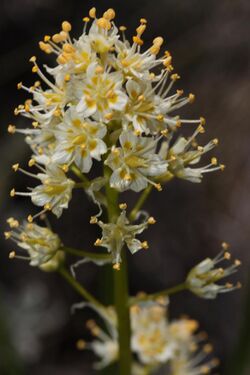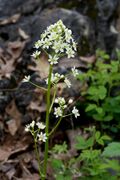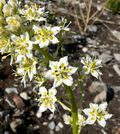Biology:Toxicoscordion
| Toxicoscordion | |
|---|---|

| |
| Toxicoscordion paniculatum | |
| Scientific classification | |
| Kingdom: | Plantae |
| Clade: | Tracheophytes |
| Clade: | Angiosperms |
| Clade: | Monocots |
| Order: | Liliales |
| Family: | Melanthiaceae |
| Tribe: | Melanthieae |
| Genus: | Toxicoscordion Rydb. |
| Synonyms[1] | |
| |
Toxicoscordion is a genus of flowering plants in the family Melanthiaceae, tribe Melanthieae, first described as a genus in 1903.[2][3] The genus is mainly distributed in the midwestern United States and western North America, with some species in western Canada and northern Mexico.[1][4][5]
Molecular phylogenetic studies in the 21st century have resulted in number of changes to placements within this tribe. Toxicoscordion was long submerged into the genus Zigadenus, but its separate position in the phylogeny of the Melanthieae has been confirmed.[5] Members of Toxicoscordion may also be distinguished from other similar members of the deathcamas tribe by the presence of narrow, clawed tepals with a single, conspicuous, rounded gland.
| Image | Scientific name | Common Name | Distribution |
|---|---|---|---|
| Toxicoscordion brevibracteatum (syn. Zigadenus brevibracteatus) | desert deathcamas | Baja California, Sonora, California | |
 |
Toxicoscordion exaltatum (syn. Zigadenus exaltatus) | giant deathcamas | California, Nevada |
| Toxicoscordion fontanum (syn. Zigadenus fontanus) | smallflower deathcamas | California | |
 |
Toxicoscordion fremontii (syn. Zigadenus fremontii) | Frèmont's deathcamas, star zigadene (several varieties) | Baja California, Oregon, California |
 |
Toxicoscordion micranthum (syn. Zigadenus micranthus) | smallflower deathcamas | Oregon, California |
 |
Toxicoscordion nuttallii (syn. Zigadenus nuttallii) | Nuttall's deathcamas | SC United States |
 |
Toxicoscordion paniculatum (syn. Zigadenus paniculatus) | foothill deathcamas, sand-corn | W United States |
 |
Toxicoscordion venenosum (syn. Zigadenus venenosus) | death camas, meadow deathcamas | W Canada, W USA, Baja California |
References
- ↑ 1.0 1.1 1.2 "Kew World Checklist of Selected Plant Families". https://powo.science.kew.org/taxon/urn:lsid:ipni.org:names:289346-2.
- ↑ Rydberg, Per Axel. 1903. Bulletin of the Torrey Botanical Club 30(5): 272–273 in English
- ↑ Tropicos, Toxicoscordion Rydb.
- ↑ Zomlefer, W. B.; N. H. Williams; W. M. Whitten; W. S. Judd (2001). "Generic circumscriptions and relationships in the tribe Melanthieae (Liliales, Melanthiaceae), with emphasis on Zigadenus: Evidence from ITS and TRNL-F sequence data". American Journal of Botany (Botanical Society of America) 88 (9): 1657–1669. doi:10.2307/3558411. PMID 21669700.
- ↑ 5.0 5.1 Zomlefer, W. B.; W. S. Judd (2002). "Resurrection of segregates of the polyphyletic genus Zigadenus s.l. (Liliales: Melanthiaceae) and resulting new combinations". Novon 12 (2): 299–308. doi:10.2307/3392971. https://www.biodiversitylibrary.org/part/36508.
- ↑ Biota of North America Program 2013 county distribution maps
Wikidata ☰ Q7830414 entry
 |

